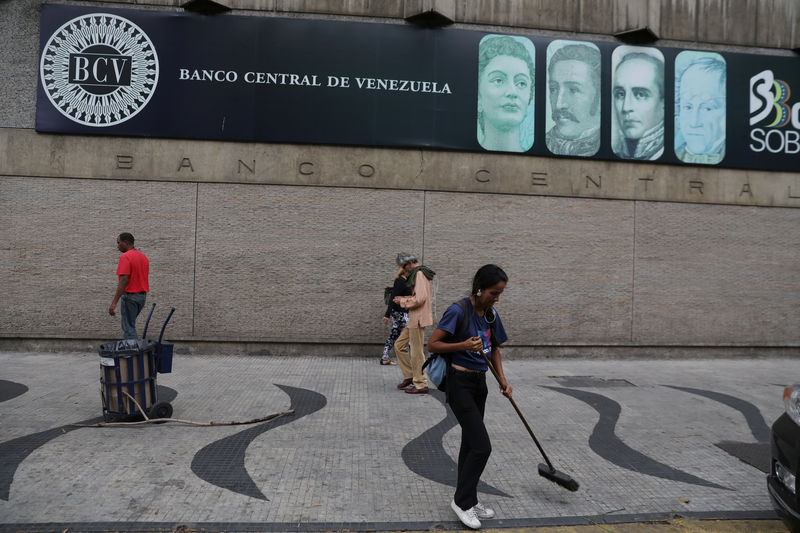By Corina Pons and Mayela Armas
CARACAS (Reuters) - Venezuela's central bank has begun using piles of cash rather than electronic transfer to sell foreign exchange to local banks, according to five finance sector sources, a sign of how the nation's economy has become increasingly primitive amid a hyperinflationary meltdown.
Foreign banks have become increasingly unwilling to carry out Venezuela-related transactions amid a raft of U.S. sanctions, meaning the central bank is unable to carry out such foreign exchange operations through foreign wire transfers as would happen almost anywhere in the world, the sources said.
Businesses for years bought hard currency that the central bank transferred to them via foreign bank accounts, and used the funds to import raw materials or machinery. But they cannot carry out such transactions with cash, because foreign providers rarely accept it, the sources said.
Banks are not interested in helping clients get the funds into foreign accounts because doing so could jeopardize their relationships with third-party correspondent banks that are sometimes suspicious that cash-related transactions could be linked to illicit activities, the sources said.
Firms instead use the euros to pay salaries or bonuses, as inflation near 2 million percent has left employees insisting that they not be paid in the battered local bolivar currency. Some use the cash to pay dividends.
Venezuela increased the use of euros rather than dollars in its foreign exchange operations following U.S. sanctions in 2017, citing the need to reduce dependence on the U.S. financial system.
"The best thing to do with (the euros) is to make cash payments to employees," said one of the sources, adding that companies on average buy around 20,000 euros ($22,000) at a time.
The central bank and the information ministry did not respond to requests for comment.
Venezuela's banks sell a combined total of about 6 million euros per week in cash, two of the sources said.
The banks send armored cars to the central bank to pick up the cash, which is usually distributed in 20, 50 and 100 euro notes.
The country's 16-year-old currency control mechanism, originally created by late socialist President Hugo Chavez, has for years sold hard currency to businesses seeking it.
But the foreign exchange auction system called Dicom has sold limited volumes in recent months, providing a mere $1.1 million over the last two weeks, according to official data.
The United States has hit Venezuela with several rounds of sanctions, including measures that block American banks from providing financing to the Venezuelan government and put restrictions on the purchase of oil by U.S. firms.
The sanctions do not explicitly prohibit companies from engaging in routine trade with Venezuela.
But the U.S. Treasury Department in April slapped sanctions on Venezuela's central bank as part of the Trump administration's drive to dislodge President Nicolas Maduro from power.
Companies have become increasingly worried about the potential legal risks of any transactions associated with Maduro's government.
Maduro says the government is victim of an "economic war" led by political adversaries and the administration of U.S. President Donald Trump, and accuses foreign media of exaggerating the country's problems for political ends.
